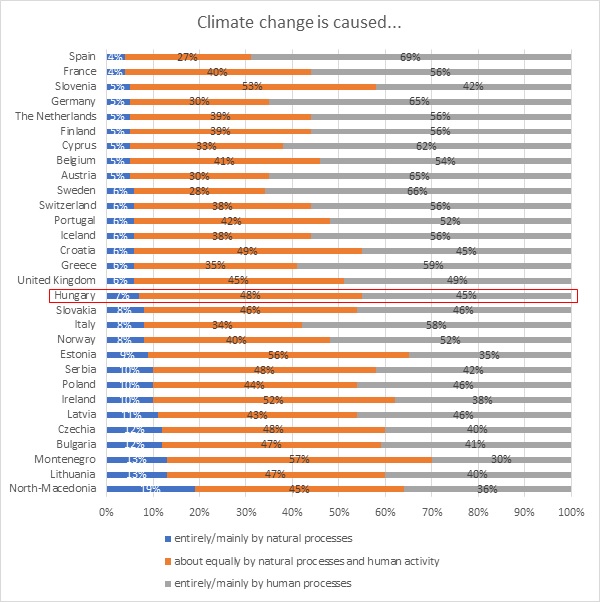Is Hungary really a champion in fighting climate change? Not really
According to the government's self-assessment, Hungary is doing well in the fight against climate change, and there is no overt denial of climate change in the government's rhetoric. However, the positive self-assessment of the government's actions is in striking contrast to the assessment of experts and the relevant statistical data. In a comprehensive study of climate change skepticism, Political Capital looked at public opinion data, media articles and a small number of expert interviews, and coined the term climate relativism, which does not deny climate change or human responsibility, but questions and trivializes the seriousness of the problems associated with it. Climate relativism dominates both discourse and government action.
Written by Ráchel Surányi, Political Capital
The term climate skepticism used to refer only to climate deniers, but it has now been broadened to include those who believe in climate change but deny the consensus around it, or that it is caused by humans, or even deny the consensus around it. Climate relativism is when someone believes that the issue of climate change is overrated.
Hungarians believe in climate change, but they have bigger problems
Looking at public opinion data, it seems that climate skepticism is low in Hungary. Based on the results of the most recent representative survey with 3000 respondents, conducted by the HUN-REN Centre for Economic and Regional Studies in 2022, 47% agree that climate change is happening and another 43% think it is probably happening. In addition, 29% and 56% respectively believe that human activities contribute completely or to a large extent to it.
According to the 2020 wave of the European Social Survey, Hungary ranks 17th among EU (+3) countries in the proportion of people (7% in Hungary) who think climate change is caused entirely/mainly by natural processes, compared to 45% who think it is caused entirely/mainly by human processes (see Figure 1 below). According to the same survey, 10% of the Hungarian population are not at all or not very worried about climate change, 47 percent are somewhat, and 43 percent are very or extremely worried about it. This is a relatively favorable proportion compared to other European countries (surveyed), for example 38% in neighboring Slovakia.
1.Figure: Do you think that climate change is caused by natural processes, human activity, or both?

By contrast, in the 2022 Ipsos survey, where respondents were asked to choose from a long list with several items, only 46% of Hungarians chose climate change as something they had worried about in the recent past. And in the most recent Special Eurobarometer (2023), where respondents had to choose the four (out of 11) most serious problems facing the world, only 33% of Hungarians chose climate change. In the same questionnaire, when asked specifically about climate change, 87% considered it a serious problem (giving an answer between 7 and 10 on a scale of 1 to 10, where it is a serious problem compared to lower numbers).
All these data show that the vast majority of the Hungarian population (80-90%) clearly believe in climate change caused by human activity. However, this issue is much less on their spontaneous problem map, so respondents do not single it out as a major problem.
„Hungary is a champion in combatting climate change” – says the official government communication
Looking at the official government channels, Political Capital’s study found three main narratives on climate change: all of them prove how important it is to tackle climate change and that the government is doing its best.
However, objective indicators and experts are unanimous in pointing out that there is a huge gap between what the government says and where Hungary stands in the green transition. For example, the absence of an environmental portfolio is in itself a signal of how important this issue is to the government. In terms of objective indicators, the MIT Green Future Index ranks Hungary 29th in 2023 (out of 76 countries surveyed), down five places from its previous ranking in 2022. In addition, several environmental organisations have raised concerns about the National Energy and Climate Plan (according to (EU)2018/1999; drawn up individually by each EU member state): they found it incomplete (targets and measures are not consistent), the targets set were not sufficient and the data cited were not always substantiated.
Climate change is overrated: climate relativism in full swing
Since it is nothing new for governments to praise themselves, Political Capital researchers also looked at the centrally organized government-controlled media, most of which – nearly 500 outlets – belong to the Central European Press and Media Foundation (KESMA), which was set up in 2018 to serve as an umbrella organization for pro–government private media. Looking at some 19,000 articles, they found – by looking at the biggest portals – that they contain a mix of climate change narratives, including climate change denial and conspiracy theories. There were also a lot of articles about how climate change is overrated (calling it "climate hysteria") and how it should be tackled with conservatism rather than radical measures, such as what the EU is forcing on Hungary (by introducing the so-called carbon tax or forcing member states to reduce carbon emissions). This suggests that the government is letting these narratives loose - without caring that the population is exposed to such issues.
While the correct communication on climate change is one that shows the seriousness of the situation, does not focus on panic-mongering, but encourages positive action, the government – despite being operated by its propaganda machinery – is not following this strategy. On the contrary: since 2015 there have been 10 rounds of so-called ’national consultations’ (more like push-polls, due to their biased nature) and several rounds of campaigns in which they spread messages about fabricated scapegoats (George Soros, the opposition, Brussels etc.). A further three consultations were dedicated to the issue of climate change with varying characteristics: the first one was a mandatory public consultation in 2019 to collect the views of citizens and organizations on the National Clean and Climate and Energy Plan. However, the government hid this consultation by making it invisible and refrained from calling it a national consultation. The second and the third (in 2021 and 2024) were also not overtly advertised as the other 10, but they were officially called ’national consultations’ and accordingly, both contained some of the ’push-poll’ elements, such as asking pseudo-questions or not touching on the real issues. However, they were not receiving as much attention as the earlier ones by advertising them on billboards.
Figure 2: Pressing of the moral panic button by the Hungarian government – and the green consultations (with broken lines)

Source: edited based on the original
All of this shows that while the government is theoretically committed to tackling climate change and does not deny the fact of climate change, it is not focused on it, to put it mildly. Moreover, digging deeper –in terms of action, communication, resource allocation and prioritization – reveals a policy that tends to systematically marginalize climate change, relativize its importance, and use it for political gains, mainly through pro-government actors.
The full study is available here.
This article was originally published on Visegrad.info on 14 June 2024 in English, as part of a joint project by EurActiv Czech Republic, EurActiv Poland, EurActiv Slovakia and Political Capital Budapest, more details on our website.


